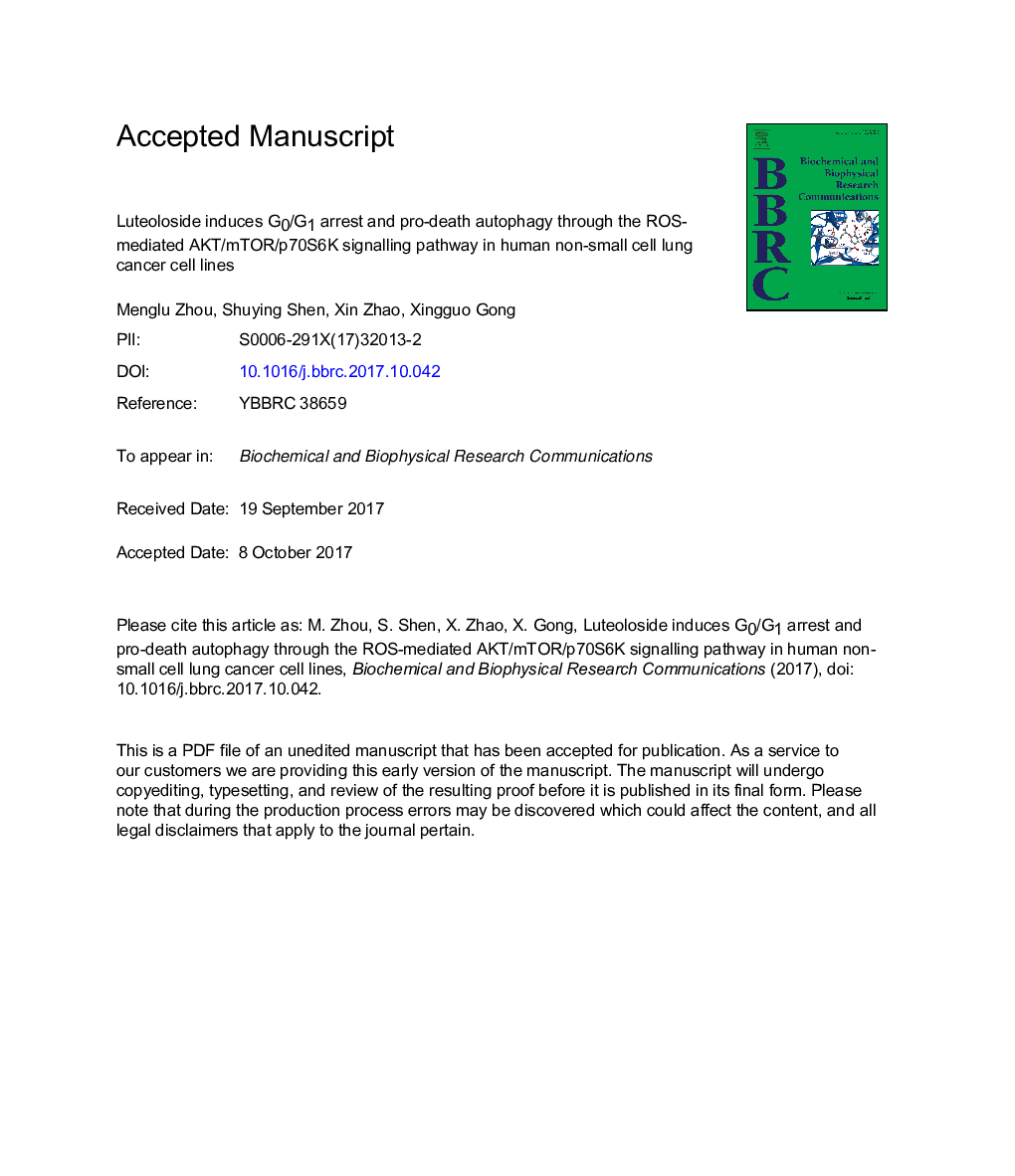| کد مقاله | کد نشریه | سال انتشار | مقاله انگلیسی | نسخه تمام متن |
|---|---|---|---|---|
| 8296038 | 1536761 | 2017 | 27 صفحه PDF | دانلود رایگان |
عنوان انگلیسی مقاله ISI
Luteoloside induces G0/G1 arrest and pro-death autophagy through the ROS-mediated AKT/mTOR/p70S6K signalling pathway in human non-small cell lung cancer cell lines
دانلود مقاله + سفارش ترجمه
دانلود مقاله ISI انگلیسی
رایگان برای ایرانیان
موضوعات مرتبط
علوم زیستی و بیوفناوری
بیوشیمی، ژنتیک و زیست شناسی مولکولی
زیست شیمی
پیش نمایش صفحه اول مقاله

چکیده انگلیسی
Autophagy has attracted a great deal of interest in tumour therapy research in recent years. However, the anticancer effect of luteoloside, a naturally occurring flavonoid isolated from the medicinal plant Gentiana macrophylla, on autophagy remains poorly understood in human lung cells. In the present study, we have investigated the anticancer effects of luteoloside on non-small cell lung cancer (NSCLC) cells and demonstrated that luteoloside effectively inhibited cancer cell proliferation, inducing G0/G1 phase arrest associated with reduced expression of CyclinE, CyclinD1 and CDK4; we further found that treatment with luteoloside did not strongly result in apoptotic cell death in NSCLC (A549 and H292) cells. Interestingly, luteoloside induced autophagy in lung cancer cells, which was correlated with the formation of autophagic vacuoles, breakdown of p62, and the overexpression of Beclin-1 and LC3-II, but not in a human bronchial epithelial cell line (BEAS-2B). Notably, pretreatment of cancer cells with 3-MA, an autophagy inhibitor, protected against autophagy and promoted cell viability but not apoptosis. To further clarify whether luteoloside-induced autophagy depended on the PI3K/AKT/mTOR/p70S6K signalling pathway, a major autophagy-suppressive cascade, cells were treated with a combination of AKT inhibitor (LY294002) and mTOR inhibitor (Rap). These results demonstrated that luteoloside induced autophagy in lung cancer cell lines by inhibiting the pathway at p-Akt (Ser473), p-mTOR and p-p70S6K (Thr389). Moreover, we observed that luteoloside-induced cell autophagy was correlated with production of reactive oxygen species (ROS). NAC-mediated protection against ROS clearly implicated ROS in the activation of autophagy and cell death. In addition, the results showed that ROS served as an upstream effector of the PI3K/AKT/mTOR/p70S6K pathway. Taken together, the present study provides new insights into the molecular mechanisms underlying luteoloside-mediated cell death in NSCLC cells and supports luteoloside as a potential anti-cancer agent for targeting NSCLC through the induction of autophagy, inhibition of proliferation and PI3K/AKT/mTOR/p70S6K signalling.
ناشر
Database: Elsevier - ScienceDirect (ساینس دایرکت)
Journal: Biochemical and Biophysical Research Communications - Volume 494, Issues 1â2, 9 December 2017, Pages 263-269
Journal: Biochemical and Biophysical Research Communications - Volume 494, Issues 1â2, 9 December 2017, Pages 263-269
نویسندگان
Menglu Zhou, Shuying Shen, Xin Zhao, Xingguo Gong,